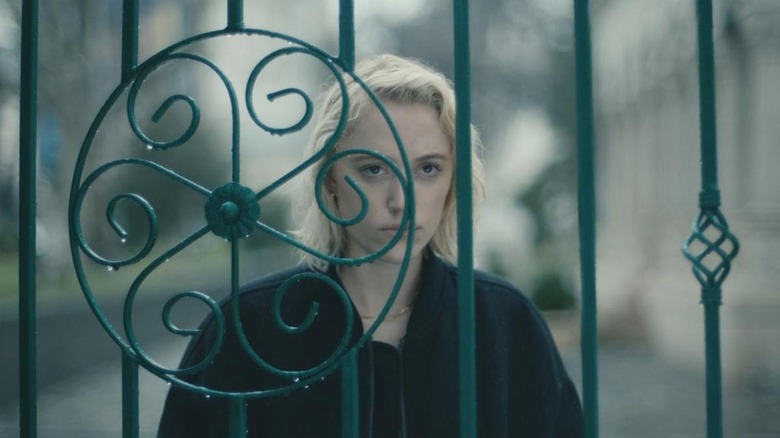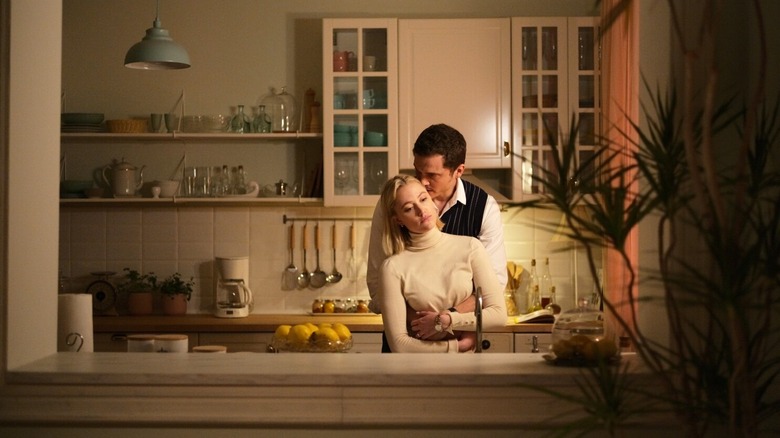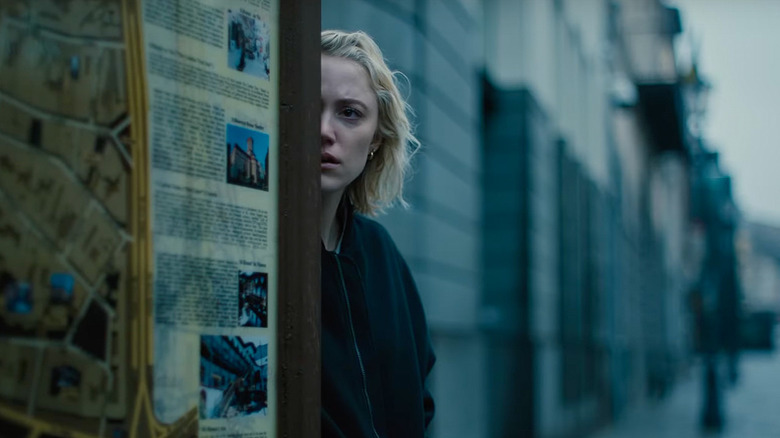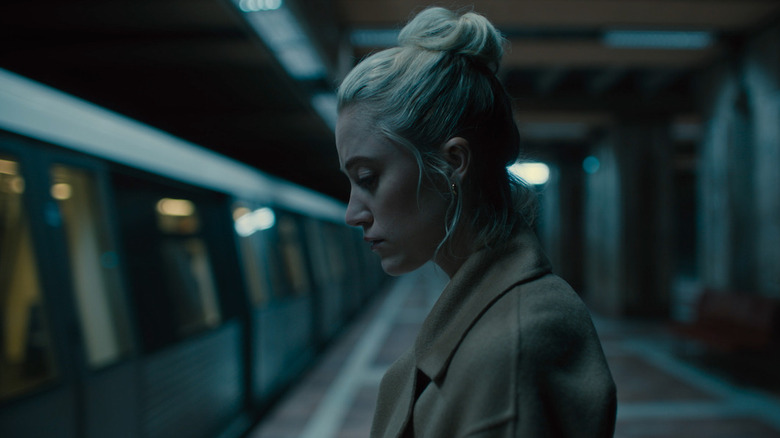Watcher Director Chloe Okuno And Star Maika Monroe On Making A Cold European Thriller [Interview]
Chloe Okuno brings old-school and new school thrillers together with her newest movie, "Watcher." The filmmaker, who previously directed a chilling horror short and a segment from a "V/H/S 94," tells the story of Julia (played by Maika Monroe), a young woman being stalked in Romania. Okuno uses classic techniques and tropes from iconic thrillers, but, as she says, with an emotion and point of view rarely ever seen in those films.
Okuno found the ideal star for her cold European thriller in Monroe, an actor who can speak loudly or softly on-screen without dialogue. The "Watcher" filmmaker and star rely more on silence than theatrics. Recently, the two told us about their experience making the film and why we just might see Maika Monroe play a killer mermaid one day.
'Maika has this innate sense of the best place to catch the light'
Chloe, this is a patient thriller but still has an urgency and propulsion to it. How did you accomplish that pace?
Okuno: It was quite a deliberate choice. We knew we wanted to do a slow burn. I always like movies that start slowly and kind of ramp up more and more so by the end, you're like, "How did I end up in this insanity?" A lot of the movies we were looking at as references with my production designer and my cinematographer were things like "The Tenant," "Rosemary's Baby," also "Lost in Translation," and "Perfect Blue."
The movie was designed to lure you into the creepiness slowly, and you're really experiencing the movie as Julia is experiencing it. I think that was something we talked about from the beginning. My editor and I certainly always knew that was the plan. With Maika, her performance was always so natural and genuine. In a lot of ways, her performance dictates the pace because we're always trying our best to be with her at any given moment and cut the movie in a way that you are experiencing it alongside her character, the way that she's experiencing it.
Maika, a lot of the movie relies on silence, so how did you want to express Julia's isolation and her arc without words?
Monroe: I think some of the most important moments in this movie are scenes where there is no dialogue. Chloe creates such an incredible environment on set. You really, as an actor, feel this freedom to go there. Honestly, shooting in Romania, I felt a lot of the things that Julia was feeling. It wasn't far off. I enjoyed living in this character. It was hard, but very close to home.
Okuno: Maika's performance communicates so much just with an expression. We didn't ever necessarily need more. Even one little moment of Maika communicating something with her eyes tells us everything we needed to know. It makes sense to focus around that as much as possible and make it as simple and lean as we could, especially because it is deliberately paced. You want to make sure all the moments that are there are landing as hard as possible, right?
Maika, you've made quite a few thrillers and horror movies. Very technical, of course, but do you have a lot of technical questions when shooting?
Monroe: Not really. I try to have the cameras and the people sort of fade away. It doesn't really matter to me if it's a wide shot or super tight on my face. I'm kind of constantly living it, so it doesn't make a huge difference. Of course, there were some specific camera moves where you need to end at this spot in front of the window. We'd go through all that before shooting. Once we started filming, you kind of forget about it all.
Okuno: I will say, Maika, you're actually so technical. I'm sure it's not conscious, but I think you are. You're 100% in the moment and in the performance; it was astounding. My DP and I were just like, "Maika has this innate sense of the best place to catch the light." It's that Greta Garbo thing. She just knows how to maximize.
Monroe: Thank you.
Okuno: It's such a blessing for a director, especially in a movie that is very technical, to have an actor who's 100% committed and in the moment. Also, an actor who genuinely wants to help me and all the crew and the people who are building this technical thing around her, do it in a way that helps us bring that part of it to life in the best way possible. So you're actually, you're one of the most technical actors I worked with. It's kind of crazy, but it must be innate or something.
Monroe: It's so funny. Yeah, I would never think of it that way, but I really appreciate that, Chloe.
'We haven't actually seen that many female filmmakers making these kinds of movies'
Maika, even though you're very much about being in the moment, what are some deliberate choices you made before "Watcher," just to help fulfill Chloe's vision?
Monroe: Definitely. Going into any project, it's important that the actor and director are on the same page and know what the feeling is throughout it all. So once you're there, once you're filming, you don't have to take time away from trying to figure that out. We know what we're trying to do. Seeing all the visuals, we went back and forth with seeing some styles and looks and all that. I think it came together nicely.
Of course, the movie speaks to fears women experience every day, but the silence I think also allows audiences to project more and fill in those silences. What interpretations and reactions to the movie have meant a lot to you so far?
Okuno: I always love it. I think there was probably a letterboxd review — which I do read, unfortunately, but it was one of the good ones — and I think a woman just said, "I felt this movie in my DNA." The reactions that mean the most to me, I think, are when people, especially women, say, "I feel seen by this movie, ironically." We're trying to show what it feels [like] to be a woman in the world. Even if something isn't overtly threatening, like if Maika's just walking down the street or she's going to the grocery store, or she's going into a movie theater, the totality of all those experiences becomes scary and exhausting. I think when people connect with it on that level, I feel like we've done our job.
By the way, a very bold choice to read letterboxd reviews.
Okuno: I can't help myself.
Monroe: I bet. I stay clear. I can't.
Okuno: For what it's worth, Maika, I can tell you, even everyone who might have a problem with the movie, not a single person has said anything negative about you, or your performance, I swear to God.
Monroe: Oh, good.
Chloe, you strike a balance of modern and old-school here. There are the techniques from the classic movies you previously mentioned, but you use those techniques to tell a story from a modern perspective.
Okuno: Yeah, definitely. It's funny — in a way, I don't know that we were doing anything radically different. I personally believe I'm not trying to reinvent the wheel as a filmmaker. I'm looking at filmmakers who I admire, and hopefully, I can learn something from them and tell a story in a way that's compelling and interesting. Obviously, people like Hitchcock have told these psychological thrillers so well. What I hope is a little bit different is the fact that I am a woman, and we haven't actually seen that many female filmmakers making these kinds of movies. Even if it's not in the technical craft, maybe the emotion of it is a little bit different. It's just the feeling of living with these things and even telling a story where, again, sometimes it's just about the fear and these small moments that don't necessarily seem that notable, but I think it's what we live with and maybe sets us apart.
'Hopefully at some point, Maika will be playing a killer mermaid'
Maika, you work with a lot of exciting directors making their feature debuts, like Chloe. Is there something appealing about that for you, being a part of these filmmakers' visions just as they're beginning?
Monroe: Oh, absolutely. I saw Chloe's short before ever receiving this script and meeting Chloe. A producer friend I respect said, "You have to see this short film." It was six, eight months before I was even sent "Watcher." I saw it and I was just like, "This person knows what they're doing." It blew me away with the cinematography, the music, how it was put together, I was just like, "Oh my God." And then six months later I received ["Watcher"] in my email and I was like, "I remember that name. Oh my God, I hope this script is amazing because I want to work with her." Read it, loved it, and we met. I meet a lot of people, but there are certain people that standout, like, I think this person has a vision, and that's how I felt immediately meeting Chloe and seeing her work.
The final shot of that short film is fantastic.
Monroe: It's amazing.
Chloe, after the short hit the festival circuit and was released, what opportunities did it create for you?
Okuno: Well, it's interesting. I mean, it was great. I was so happy that people responded to it and it did festivals and it definitely got me meetings with producers and apparently even made its way to Maika Monroe, which is awesome. Still, for me, the journey from short to feature certainly didn't happen immediately. I made that short film in 2014 and I did get hired on some jobs off of it. Obviously, we didn't make "Watcher," which is my first feature, until last year. I think even the most successful short — at least for me, it might be different for some people — it gives you opportunities, but it's not a golden ticket. It still takes an insanely long time to get that first feature off the ground.
I just noticed, Chloe, is that a "Charade" poster behind you?
Okuno: Yeah, it is. It's actually the "Charade" poster from our movie.
Fitting for the movie, thematically, but kind of like that film, you and [the cinematographer] Benjamin [Kirk Nielsen] let certain colors really pop, even with the darkness present.
Okuno: Benjamin is obviously so incredibly talented, and we worked together as well on the short film. We have very similar tastes when it comes to movies and we also approach filmmaking the same way, partially because of our background at AFI. It's just a sensibility thing: We're always trying to find the story based off of the protagonist's emotions and her journey, and how do we visually film that?
The color was a big part of the story of this film. It was something that we talked about with the costume designer and with a production designer extensively. We wanted to build the story where when Maika first shows up as Julia, she's confident and she wears these bright reds. The story starts with her initially being this vibrant person, not afraid to be seen. And then she disappears into herself a little bit and we put her more in neutrals and found clothes to match the locations and the sets. So yeah, that was the color story of the movie.
The camera gets closer and closer to Julia throughout the movie, but how did you also want the sound to convey that sense of discomfort?
Okuno: We had a brilliant sound designer, but my editor and I also from the beginning worked a lot of sound design into our cuts, which is something that editors don't always do. Some of them just leave sound for the end, but for me, sound dictates the picture, so we put a lot of that into our early cuts.
We looked at "Perfect Blue," the Satoshi Kon movie, which was also about a woman being stalked. They use a lot of ambient noise to get under your skin — not noise, but sounds that are organic to the atmosphere you're in. But you design it in a way where it supports the horror and the genre and the suspense.
This is a movie where I think one of our biggest challenges from the sound level is, we want this to feel like a cold European thriller that's kind of classic. We didn't want to use the sort of big sound cues that you usually get in horror movies. We're always looking for classy stings, which don't really exist. It's finding ways to build that stuff in from the actual environment as much as possible.
Speaking of horror movies, you want to make a mermaid horror movie next, right? Maika, I hope you end up in that one, too.
Okuno: Oh, man. Well, this is an idea I've had forever and I adore it. Maybe a long story, but basically, my major in college was Russian. When I was living in Russia, I heard about the particular Russian folklore around mermaids called Rusalka. They're women who have been killed or have killed themselves in water, mostly because of men. You know, men kill them or they kill themselves because of heartbreak. They come back as these vengeful spirits who lure men to their death in water. I was just like, "That's such a cool concept. I really want to see that movie." I'm working on it, actually. I'm developing it now with "Watcher" producers. Hopefully at some point, Maika will be playing a killer mermaid.
Monroe: I'm in. Sign me up.
"Watcher" is now playing in theaters.



